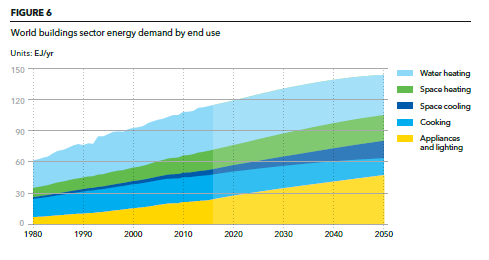- According to the latest DNV-GL report , buildings consume 29% of the world’s energy.
- This share will grow by 0.5-1% annually.
- Urbanization and rural electrification in the developing world will result in a significant rise in energy demand for appliances & lighting, and space cooling.
Buildings consumed 29% of the world’s energy in 2016, which amounts to 114 EJ/year. This share will grow by 0.5-1% annually, with the more vigorous growth occurring at the start of the forecast period. Overall energy use by buildings will reach 145 EJ/ year in 2050 (Figure 6 below).
There are likely to be significant changes in energy use by sub-sectors in the buildings category – namely, space heating, space cooling, water heating, cooking, and appliances & lighting. Urbanization and rural electrification in the developing world will result in a significant rise in energy demand for appliances & lighting, and space cooling.
This rise in demand will occur even though energy drawn by space heating will remain relatively stable, and despite the energy savings that will result from the switch to cooking with gas and electricity in the developing world. Continued digitalization of industry and society will see an increased need for data centres and computers, but this will account for only 3 EJ or 2% of building energy demand by 2050.

DNV GL research model is designed by encompassing demand and supply of energy globally, and the use and exchange of energy within and between ten world regions. The core of this is a system-dynamics feedback model, implemented in Stella software. The model incorporates the entire energy system — from source to end use — and simulates how its components interact. The model includes all the main consumers of energy (buildings, industry, transportation and feedstock) and all sources supplying the energy.
Source: DNV-GL











